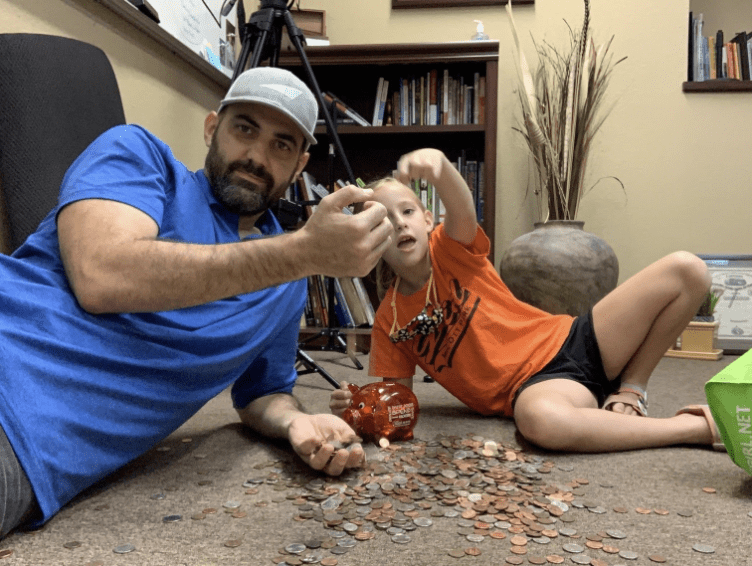4 traits to teach your kids to set them up for financial success
 When’s the last time you talked about money and finances? Not just your monthly budgeting, but about principles and values that you build your finances upon. Do you talk about it with your partner? Your family? Your friends? What about your kids?
When’s the last time you talked about money and finances? Not just your monthly budgeting, but about principles and values that you build your finances upon. Do you talk about it with your partner? Your family? Your friends? What about your kids?
Our children learn math and numbers in depth at school, but finances are generally not taught. Even in business school, the finances I was taught were corporate finances, which hardly prepared me for the world of personal finance.
Parents, we are our children’s first money teachers. The lessons we teach are not just spoken, but observed. We model behaviors for our children in everything we do and don’t do, and our kids pick up on it.
The funny thing is when it comes to teaching our kids about money, as parents we generally don’t follow the advice we give.
Let me give you a scenario that you have probably experienced before. You are running errands with your child, and they see a toy that they want.
“Mommy/Daddy, can you buy me that _________ (fill in the blank)”?
Assuming you do not want to buy the toy, typically as a parent we default to one of four responses:
- “No, we don’t have money for that.”
- “No, we don’t need that.”
- “Maybe you can ask for that for your birthday.”
- “How about you start saving your money and buy it when you have enough.”

We will see in a second that each of these responses corresponds with a healthy financial trait we want our kids so that they will learn to develop healthy spending habits. We as adults should exhibit these traits as well to set us up for financial success.
4 money behaviors to teach our kids
In the first two responses the kid hears “No.” According to Dr. Roy Salgado, depending on our child’s developmental age, they will handle this differently. The younger they are and the more immature they are, the more they will respond with their feelings. Let’s face it, we have all been in public with a toddler throwing a tantrum at one point or another. Now as they get older, our kids learn that their feelings do not equal logic. Feelings can mislead us and we must learn to accept reality when it comes to finances.
Trait 1: Self-Control
“No, we don’t have money for that.”
Sometimes we simply need to say no. If you don’t have money for it and still choose to buy it you end up in debt. This teaches our kids to live within their means.
Trait 2: Self-Denial
“No, we don’t need that.”
We may have the money, but choose not to spend it. This reality may be a hard one for kids to accept but is an important lesson to learn. This teaches them that they do not need to indulge in everything they want.
Trait 3: Delayed Gratification
“Maybe you can ask for that for your birthday or Christmas.”
It isn’t something they can have now but may have an opportunity to get it at a later time. Similar to self-denial, this teaches our children you do not need to indulge in everything you want right now. We can set financial priorities, and stick to them.
Trait 4: Discipline
“How about you start saving your money and you can buy it when you have enough.”
Teaching our children to save money is one of the most important strategies we can relay to them. By saving money diligently and planning to make intentional, well throughout purchases will keep them from making poor decisions.
 Which response do you default to most as a parent?
Which response do you default to most as a parent?
What response do you default to most as an adult when you see something you want to purchase? Do you set the example and do your kids see you deny yourself from impulse purchases? Are you the person that partakes in instant gratification when it comes to spending money? How self-aware are you of your own financial behaviors?
A 2011 study from the University of Minnesota says this:
“Parents provide 3 themes of financial management to children including saving, how money is managed, and how financial matters are discussed. The vast majority of children in these studies learned about a family’s propensity for saving and financial management through direct observation versus through conversations regarding these behaviors. In other words, parental behaviors tend to stick with children more so than discussions of what ought to be done related to money.”
Now as parents, we want the best for our kids. We want our kids to be successful and learn to create good habits. We also don’t want them to have to experience pain and we especially don’t want them to go without.
Parents, we all need to be more intentional and look for opportunities to show and talk about money and finances with our kids. Everyday experiences are opportunities to teach and instill life lessons, including financial lessons so they can better their financial future.
About Erik Garcia
 Erik is a CERTIFIED FINANCIAL PLANNER™ (CFP®) and investment advisor.
Erik is a CERTIFIED FINANCIAL PLANNER™ (CFP®) and investment advisor.
He and his wife Jennifer were both born and raised in New Orleans and keep busy by raising 3 kids and 3 backyard chickens.
Erik loves culture and being born to Cuban parents in one of America’s most soulful cities. He is privileged to be surrounded by some of the richest cultures on planet earth; from food to music, it’s hard to beat New Orleans and Cuba.
He is a Saints fan, a soccer fan, an entrepreneur, and a lover of coffee.
Erik launched the Building Us podcast in 2020 with his co-host Dr. Matt Morris, a show about relationships with people, with community, and with money.
His earliest memory of “working with money” was when his grandfather would empty the change from his pockets into an ashtray. He let Erik take all the quarters and Erik would exchange the quarters for dollar bills with his uncle, who needed the change to ride the bus. This made buying baseball cards easier for Erik.
















